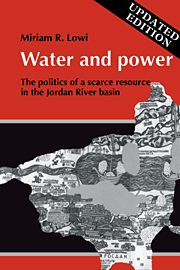Book contents
- Frontmatter
- Contents
- List of illustrations
- List of tables
- Preface
- Preface to the paperback edition
- List of abbreviations
- 1 Introduction: conflict and cooperation in international river basins
- Part I Riparian dilemmas
- 2 The environment of conflict in the Jordan basin
- 3 Riparian disputes compared
- Part II The Jordan waters conflict
- Part III The Jordan basin since 1967
- Appendix 1 US involvement in water development in the Jordan basin
- Appendix 2 The unified development of the water resources of the Jordan Valley region
- Appendix 3 The Arabs' plan for development of water resources in the Jordan Valley
- Appendix 4 The Cotton plan for the development and utilization of the water resources of the Jordan and Litani River basins
- Appendix 5 Annex II: from, Treaty of Peace Between the State of Israel and the Hashemite Kingdom of Jordan
- Notes
- Select bibliography
- Index
- Cambridge Middle East Library
3 - Riparian disputes compared
Published online by Cambridge University Press: 08 December 2009
- Frontmatter
- Contents
- List of illustrations
- List of tables
- Preface
- Preface to the paperback edition
- List of abbreviations
- 1 Introduction: conflict and cooperation in international river basins
- Part I Riparian dilemmas
- 2 The environment of conflict in the Jordan basin
- 3 Riparian disputes compared
- Part II The Jordan waters conflict
- Part III The Jordan basin since 1967
- Appendix 1 US involvement in water development in the Jordan basin
- Appendix 2 The unified development of the water resources of the Jordan Valley region
- Appendix 3 The Arabs' plan for development of water resources in the Jordan Valley
- Appendix 4 The Cotton plan for the development and utilization of the water resources of the Jordan and Litani River basins
- Appendix 5 Annex II: from, Treaty of Peace Between the State of Israel and the Hashemite Kingdom of Jordan
- Notes
- Select bibliography
- Index
- Cambridge Middle East Library
Summary
As in the Jordan River basin, in the Euphrates, Indus, and Nile basins, there has been conflict among the riparian states over the allocation and utilization of the rivers' waters. All four riparian disputes are located in arid or semi-arid regions, where resource scarcity is a fact of life. In all four cases and for some or all of the riparians, dependence on the river system is great. The basin states have very important agricultural sectors; they depend on the river primarily for irrigation water. For at least some of the states in each basin, unimpeded access to the water resources is linked to national security concerns. As noted in chapter 1, basin-wide, integrated development has been advocated as the optimal means for sharing the waters of an international river, especially in situations of acute need. However, in none of the cases have the basin states elected this approach.
While the three cases share with the Jordan dispute certain basic similarities, there are significant differences in conditions and variables that account for the variation in outcomes. First, in the Nile basin, there is no protracted conflict over multiple issues among the riparian states as there is in the Jordan, Indus, and to a somewhat lesser extent, Euphrates basins.
- Type
- Chapter
- Information
- Water and PowerThe Politics of a Scarce Resource in the Jordan River Basin, pp. 54 - 76Publisher: Cambridge University PressPrint publication year: 1993



